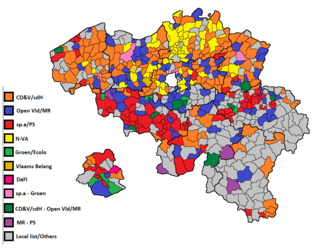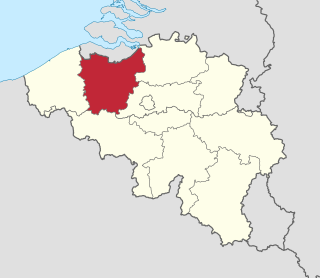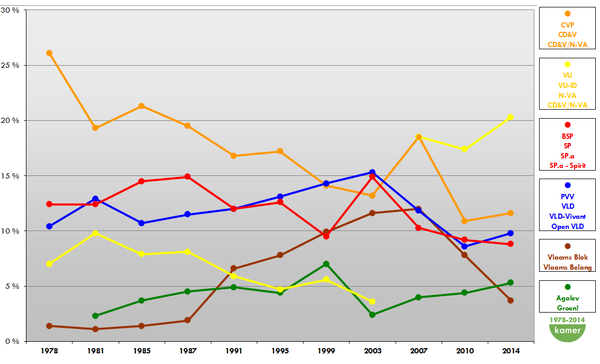
Ninove is a city and municipality located in the Flemish province of East Flanders in Belgium. It is situated on the river Dender, and is part of the Denderstreek. The municipality comprises the city of Ninove proper and since the 1976 merger of the towns of Appelterre-Eichem, Aspelare, Denderwindeke, Lieferinge, Meerbeke, Nederhasselt, Neigem, Okegem, Outer, Pollare and Voorde. On 1 January 2012 Ninove had a total population of 37,289. The total area is 72.57 km² which gives a population density of 514 inhabitants per km².

Belgium is a federal state with a multi-party political system, with numerous parties who factually have no chance of gaining power alone, and therefore must work with each other to form coalition governments.

The Flemish Movement is the political movement for greater autonomy of the Belgian region of Flanders, for protection of the Dutch language, for the overall protection of Flemish culture and history, and in some cases, for splitting from Belgium and forming an independent state.
On 13 June 2004, regional elections were held in Belgium, to choose representatives in the regional councils of the Flemish Parliament, the Walloon Parliament, the Brussels Parliament and the German-speaking Community of Belgium. The elections were held on the same day as the European elections.

Flanders is both a cultural community and an economic region within the Belgian state, and has significant autonomy.

Flemish political parties operate in the whole Flemish Community, which covers the unilingual Flemish Region and the bilingual Brussels-Capital Region. In the latter, they compete with French-speaking parties that all also operate in Wallonia. There are very few parties that operate on a national level in Belgium. Flanders generally tends to vote for right-wing, conservative parties, whereas in French-speaking Belgium the socialist party is usually the most successful one.

The Belgian provincial, municipal and district elections of 2006 took place on Sunday 8 October 2006. The electors have elected the municipal councillors of 589 cities and towns as well as the ten provincial councils. The voters in the town of Antwerp have also been able to vote for the city's district councils. In seven Flemish municipalities with a special language statute and in the Walloon municipality of Comines-Warneton the aldermen and the members of the OCMW/CPAS council have also been directly elected.

The Dutch-speaking electoral college is one of three constituencies of the European Parliament in Belgium. It currently elects 12 MEPs using the d'Hondt method of party-list proportional representation. Previously it elected 13 MEPS, until the 2013 accession of Croatia. Before that, it elected 14 MEPs, until the 2007 accession of Bulgaria and Romania.

The 2007 Belgian federal election took place on Sunday 10 June 2007. Voters went to the polls in order to elect new members for the Chamber of Representatives and Senate.
The 2007–2008 Belgian government formation followed the general election of 10 June 2007, and comprised a period of negotiation in which the Flemish parties Flemish Liberal Democratic, Christian Democratic and Flemish (CD&V) and New Flemish Alliance (N-VA), and the French-speaking parties Reformist Movement (MR), Democratic Front of Francophones (FDF) and Humanist Democratic Centre (CdH) negotiated to form a government coalition. The negotiations were characterized by the disagreement between the Dutch- and French-speaking parties about the need for and nature of a constitutional reform. According to some, this political conflict could have led to a partition of Belgium.

Elections for the Federal Parliament were held in Belgium on 13 June 2010, during the midst of the 2007-11 Belgian political crisis. After the fall of the previous Leterme II Government over the withdrawal of Open Flemish Liberals and Democrats from the government the King dissolved the legislature and called new elections. The New Flemish Alliance, led by Bart De Wever, emerged as the plurality party with 27 seats, just one more than the francophone Socialist Party, led by Elio Di Rupo, which was the largest party in the Wallonia region and Brussels. It took a world record 541 days until a government was formed, resulting in a government led by Di Rupo.

The Belgian provincial, municipal and district elections of 2012 took place on 14 October. As with the previous 2006 elections, these are no longer organised by the Belgian federal state but instead by the respective regions:
The sixth state reform in the federal kingdom of Belgium is the result after the 2010–2011 Belgian government formation, with 541 days of negotiations the longest ever in Belgium and possibly the world. The agreement was made among the Christian-democratic CD&V and cdH, social-democratic sp.a and PS, liberal Open Vld and MR and ecologist Groen! and Ecolo, each respectively a Flemish and French-speaking party. The first six parties, therefore not including the green parties, then formed the Di Rupo I Government. The Flemish nationalist party New Flemish Alliance, which became the largest after the 2010 elections, is notably not part of the agreement nor of the government coalition.
Regional elections were held in Belgium on 25 May 2014 to choose representatives for the Flemish Parliament, Walloon Parliament, Brussels Parliament and the Parliament of the German-speaking Community. These elections were held on the same day as the 2014 European elections as well as the 2014 Belgian federal election.
Following the simultaneous federal elections and regional elections of 25 May 2014, negotiations started to form a new Federal Government as well as new regional governments: a Flemish, Walloon, French Community and Brussels Government. A Government of the German-speaking Community was formed only a few days after the elections.

The 2019 Belgian federal election will take place on the same day as the 2019 European Parliament elections and the 2019 Belgian regional elections, being 26 May 2019, unless snap elections are called.

The Belgian provincial, municipal and district elections of 2018 took place on Sunday 14 October 2018. They are organised by the respective regions:
The 2019 Belgian regional elections will take place on Sunday 26 May, the same day as the 2019 European Parliament election as well as the Belgian federal election unless snap federal elections are called.


























